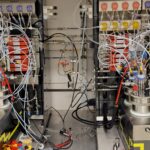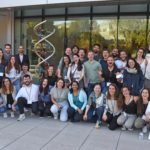Gas fermentation, a process in which microorganisms convert waste gases into commodity chemicals, has the potential to inexpensively manufacture sustainable bio-based materials and fuels to help create a circular bioeconomy. In response to industry requests, ABPDU has purchased, installed, and commissioned gas fermentation equipment with internal Berkeley Lab funding. This capability now enables ABPDU’s industrial collaborators to pursue process development and scale-up projects involving the bioconversion of gaseous feedstocks.
Multi-lab Separations Consortium Aims to Decarbonize Biofuels
The Bioprocessing Separations Consortium, originally established in 2016 by the U.S. Department of Energy’s (DOE) Bioenergy Technologies Office (BETO) and led by Argonne National Laboratory, recently received a three year funding renewal to continue advancing separations technologies critical to converting biomass to low-carbon biofuel. The Biosciences Area’s Advanced Biofuels and Bioproducts Process Development Unit (ABPDU) represents Berkeley Lab as a partner in the consortium.
Bacteria for Blastoff: Using Microbes to Make Supercharged New Rocket Fuel
A group of biofuel experts led by Berkeley Lab took inspiration from an extraordinary antifungal molecule made by Streptomyces bacteria to develop a totally new type of fuel that has projected energy density greater than the most advanced heavy-duty fuels used today, including the rocket fuels used by NASA.
Onsite PhD Student Visit Amps Up Collaborative Spirit
Biosciences Area staff recently hosted 40 PhD students from Wageningen University in the Netherlands over two days at Emery Station East (ESE) and the Integrative Genomics Building (IGB). The group launched their two-week California tour in the Bay Area, stopping by local biotechnology companies and prominent academic research institutions. The contingent visited ESE to tour the facility, make presentations, and discuss potential collaborations. At the IGB, the students attended a day-long symposium that included short talks, tours of several user facilities, and a poster reception.
Biosciences Area Project Receives Technology Commercialization Funding Award from Department of Energy
Three Berkeley Lab projects were awarded more than $2 million from the DOE’s Technology Commercialization Fund (TCF) to further collaborative research and development with industry partners on radioactivity detecting technology, next generation electrodes for electrolysis of water, and high performance sustainable aviation fuel. In addition, industry partners are matching the DOE funds for an additional $2 million. A project from the Biosciences Area was among those awarded, funding the scale-up of a high-performance sustainable aviation fuel.
Was this page useful?







